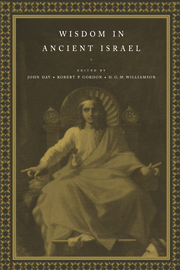Book contents
- Frontmatter
- Contents
- List of abbreviations
- Introduction
- Part 1 The ancient near eastern setting
- Part 2 Old Testament and Apocryphal texts
- 4 Foreign Semitic influence on the wisdom of Israel and its appropriation in the book of Proverbs
- 5 The limits of theodicy as a theme of the book of Job
- 6 Qoheleth
- 7 A house divided: wisdom in Old Testament narrative traditions
- 8 Wisdom in Solomonic historiography
- 9 Amos and wisdom
- 10 Hosea and the wisdom tradition: dependence and independence
- 11 Isaiah and the wise
- 12 Jeremiah and the wise
- 13 The wisdom psalms
- 14 Wisdom and Daniel
- 15 Ecclesiasticus: a tract for the times
- 16 The Christian use and the Jewish origins of the Wisdom of Solomon
- Part 3 Themes
- Biographical note: John Adney Emerton
- Bibliography of the works of John Adney Emerton
- Indexes
- Principal biblical and apocryphal references
7 - A house divided: wisdom in Old Testament narrative traditions
Published online by Cambridge University Press: 16 October 2009
- Frontmatter
- Contents
- List of abbreviations
- Introduction
- Part 1 The ancient near eastern setting
- Part 2 Old Testament and Apocryphal texts
- 4 Foreign Semitic influence on the wisdom of Israel and its appropriation in the book of Proverbs
- 5 The limits of theodicy as a theme of the book of Job
- 6 Qoheleth
- 7 A house divided: wisdom in Old Testament narrative traditions
- 8 Wisdom in Solomonic historiography
- 9 Amos and wisdom
- 10 Hosea and the wisdom tradition: dependence and independence
- 11 Isaiah and the wise
- 12 Jeremiah and the wise
- 13 The wisdom psalms
- 14 Wisdom and Daniel
- 15 Ecclesiasticus: a tract for the times
- 16 The Christian use and the Jewish origins of the Wisdom of Solomon
- Part 3 Themes
- Biographical note: John Adney Emerton
- Bibliography of the works of John Adney Emerton
- Indexes
- Principal biblical and apocryphal references
Summary
Wisdom texts and wisdom criteria
The credit (or otherwise) for setting the hare of Old Testament ‘wisdom narrative’ running must go to Gerhard von Rad, though in his Theologie des Alien Testaments he notes that Johannes Hempel had already suggested a link between narrative and wisdom back in 1936. Von Rad's short essay on the Joseph narrative in Gen. xxxvii–1, published in 1953, sought to demonstrate that these chapters were heavily influenced from Egyptian sources and were to be recognized as a form of early Israelite wisdom writing. The story of how the branches of the Joseph ‘wisdom narrative’ ran over the wall to affect other areas of Old Testament narrative is sufficiently well known to require only the briefest recapitulation here.
In his 1944 essay on historical writing in early Israel von Rad had developed the view that the reign of Solomon marked the beginning of a new phase in Israelite historical consciousness, and he had highlighted the (so-called) ‘Succession Narrative’ – ‘the oldest specimen of ancient Israelite historical writing’ (p. 12 [E. tr., p. 176]) –as exemplifying this new outlook. In short, the author of the ‘Succession Narrative’ commends a more secular view of history according to which God remains involved in human affairs, but in a less visibly interventionist kind of way than had previously been imagined.Von Rad's 1953 essay on the Joseph narrative located these chapters in the same general period of the early monarchy and also, as we have already noted, sought to demonstrate links between the narrative and Israelite wisdom traditions.
- Type
- Chapter
- Information
- Wisdom in Ancient Israel , pp. 94 - 105Publisher: Cambridge University PressPrint publication year: 1995
- 3
- Cited by

